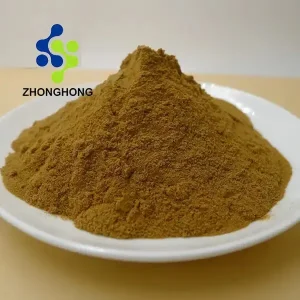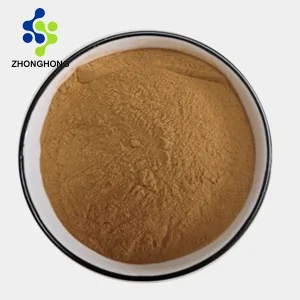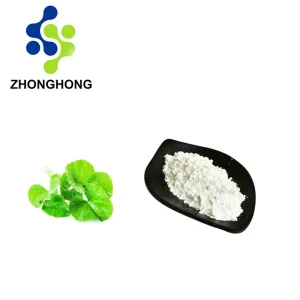Hyaluronic Acid from Plant Fermentation: Unveiling the Elixir of Youthful Hydration
1. Introduction
Shaanxi Zhonghong Investment Technology Co., Ltd. has emerged as a titan in the high-tech domain, expertly navigating the realms of chemistry, materials, and life sciences. Our integrated business model, fusing agile R&D, joint innovation, state-of-the-art manufacturing, and global marketing, empowers us to offer you premier plant-based extracts. Among our star products is Hyaluronic Acid from Plant Fermentation, a revolutionary ingredient that has taken the beauty and healthcare industries by storm.
2. Company Edge
2.1 Research Prowess
Our strategic alliances with 5 top-notch universities have led to the establishment of joint laboratories, which are cauldrons of innovation. Armed with over 20 patented technologies and a proprietary global compound library, our research on plant-fermented Hyaluronic Acid delves deep into its molecular architecture. This enables us to optimize fermentation and extraction processes, setting new benchmarks in the market.
2.2 State-of-the-Art Equipment Arsenal
Equipped with international front-runners like high-performance liquid chromatography and superconducting nuclear magnetic resonance spectrometers, we ensure product excellence. Our purity benchmarks exceed the industry average by 20%, guaranteeing that our Hyaluronic Acid is of the highest caliber, free from impurities that could compromise its efficacy.
2.2.3 Global Connectivity
With a far-reaching network spanning over 30 countries across Asia, Europe, and the Americas, we are the linchpin for multinational pharmaceutical companies and research institutions. Whether it’s formulating revolutionary pharmaceuticals, creating innovative cosmetics, or developing nutraceuticals, our Hyaluronic Acid can be custom-tailored to meet every need.
3. Product Insights
3.1 What is Hyaluronic Acid from Plant Fermentation?
Hyaluronic Acid from Plant Fermentation is a bioengineered marvel. It is produced through a sophisticated fermentation process using plant-derived substrates, yielding a high-quality, sustainable alternative to traditional animal-derived or synthetic hyaluronic acid. This form of hyaluronic acid mimics the body’s natural hyaluronic acid, playing a crucial role in maintaining skin hydration, joint lubrication, and overall tissue health.
3.2 Physical and Chemical Attributes Hyaluronic Acid from Plant Fermentation
- Appearance: It typically presents as a clear, viscous liquid or a white to off-white powder, depending on the formulation. The liquid form has a smooth, gel-like consistency, while the powder is fine and easily soluble.
- Solubility: Highly soluble in water, it forms a clear solution that can be seamlessly incorporated into various products.
- Stability: When stored under optimal conditions – cool, dry, and protected from light – it retains its viscoelastic properties and biological activity over time.
4. Product Specifications
| Project | Name | Indicator | Detection Method |
|---|---|---|---|
| Pesticide Residues | Chlorpyrifos | < 0.01 ppm | Gas Chromatography-Mass Spectrometry (GC-MS) |
| Cypermethrin | < 0.02 ppm | GC-MS | |
| Carbendazim | < 0.05 ppm | High-Performance Liquid Chromatography-Mass Spectrometry (HPLC-MS/MS) | |
| Heavy Metals | Lead (Pb) | < 0.5 ppm | Inductively Coupled Plasma-Mass Spectrometry (ICP-MS) |
| Mercury (Hg) | < 0.01 ppm | Cold Vapor Atomic Absorption Spectroscopy (CVAAS) | |
| Cadmium (Cd) | < 0.05 ppm | ICP-MS | |
| Microbial Contamination | Total viable count | < 100 CFU/g | Standard microbiological plating techniques |
| Escherichia coli | Absent | Polymerase Chain Reaction (PCR) and plating | |
| Salmonella | Absent | PCR and plating | |
| Vibrio parahaemolyticus | Absent | PCR and plating | |
| Listeria monocytogenes | Absent | PCR and plating |
5. Production Process
- Sourcing Prime Raw Materials: We meticulously source plant-based substrates from sustainable agricultural sources. These substrates are carefully selected to ensure optimal fermentation conditions and high-quality hyaluronic acid production.
- Fermentation Methodology: Employing a proprietary strain of microorganisms, we initiate a carefully controlled fermentation process. This process is optimized for temperature, pH, and nutrient supply to maximize hyaluronic acid yield. The microorganisms metabolize the plant substrates, synthesizing hyaluronic acid as a by-product.
- Purification Steps: After fermentation, the crude product undergoes a series of purification procedures. Ultrafiltration, ion-exchange chromatography, and gel filtration chromatography are deployed to remove impurities, proteins, and other unwanted substances, resulting in a highly purified Hyaluronic Acid extract.
- Drying and Packaging: The purified extract can be dried using vacuum freeze-drying or spray drying methods to obtain a stable powder form. It is packaged in light-resistant, sealed containers to safeguard its quality and extend its shelf life. For the liquid form, it is packaged in sterile, airtight bottles.
6. Key Applications
6.1 Skincare and Beauty
- In the beauty industry, Hyaluronic Acid from Plant Fermentation is a staple ingredient. It has an unparalleled ability to attract and retain moisture, keeping the skin hydrated, plump, and youthful-looking. It can be found in moisturizers, serums, masks, and eye creams, addressing issues like dry skin, fine lines, and wrinkles.
- For those with sensitive skin, the plant-fermented version is often better tolerated as it is less likely to cause irritation compared to some animal-derived or synthetic alternatives.
6.2 Joint Health
- In the healthcare sector, it is used in supplements and injectable formulations to support joint health. By lubricating the joints and reducing friction, it helps alleviate pain and discomfort associated with arthritis and other joint disorders.
- Athletes and individuals with physically demanding jobs can benefit from its use to maintain joint flexibility and prevent injuries.
6.3 Ophthalmology
- In the field of ophthalmology, it is used in eye drops and other ocular formulations. It helps maintain the moisture content of the eye, preventing dryness and irritation, especially in individuals who spend long hours in front of screens or in dry environments.
7. Hyaluronic Acid from Plant Fermentation Physiological Efficacy for Different Groups
7.1 Beauty Aficionados
- For beauty lovers, this hyaluronic acid is a game-changer. It provides intense hydration, giving the skin a dewy glow and reducing the appearance of pores. Regular use can transform dull, dehydrated skin into a radiant complexion.
7.2 Aging Population
- As people age, skin loses its elasticity and joints become stiffer. The application of plant-fermented Hyaluronic Acid in skincare and joint supplements can help the elderly regain some of that lost vitality, improving their quality of life.
7.3 Office Workers
- Those who spend hours at a desk staring at a computer screen often experience eye strain and dry eyes. Using eye drops containing hyaluronic acid can provide instant relief, keeping their eyes comfortable and focused throughout the workday.
8. Quality Control
We have instituted a comprehensive quality control paradigm to safeguard the integrity and efficacy of our Hyaluronic Acid from Plant Fermentation. At the raw material ingress, we deploy DNA analysis and spectroscopic techniques to authenticate the plant substrates and assess their quality. During the fermentation and purification odyssey, real-time sampling and analysis via high-performance liquid chromatography and other state-of-the-art methods ensure process fidelity and impurity minimization. Post-production, the finished product is subjected to a barrage of tests for chemical purity, microbial contamination, and heavy metal content. Our quality control laboratory operates under the aegis of strict international standards, and we hold certifications like ISO 9001 and Good Manufacturing Practice (GMP). This multi-pronged approach guarantees that only the crème de la crème of Hyaluronic Acid reaches our customers, endowing them with a reliable and efficacious ingredient for their ventures.
9. Use Tutorial
- In skincare products, for facial creams and serums, a concentration of 0.5% – 2% is commonly used. Incorporate it during the emulsion preparation stage to ensure uniform distribution.
- In joint supplements, follow the recommended dosage on the product label, usually ranging from 50 to 200 mg per day. Consult a healthcare professional before starting any new supplement regimen.
- For eye drops, use as directed by the ophthalmologist or according to the product instructions, typically 1 – 2 drops per eye, several times a day.
10. Packaging and Shipping
- Our Hyaluronic Acid is packaged in light-resistant, sealed aluminum foil bags or fiber drums for the powder form, and sterile, airtight bottles for the liquid form, contingent on the quantity. This packaging safeguards against light, moisture, and air ingress, ensuring product stability and potency.
- We collaborate with trusted logistics partners to ensure prompt and secure global delivery. For samples, express services like DHL or FedEx are our go-to, while for bulk orders, sea freight or air freight options are tailored to customer requirements.
11. Samples and Ordering
- Keen to explore the potential of our Hyaluronic Acid from Plant Fermentation? Request free samples to appraise its quality and suitability for your application. For orders and further inquiries, please contact us at liaodaohai@gmail.com.
12. After-Sales Service
- Our dedicated customer service squad is onStandby 24/7 to assist you. Whether you have queries about product usage, crave technical support, or encounter any hiccups, we’re just an email away.
13. Company Information
- Company Name: Shaanxi Zhonghong Investment Technology Co., Ltd.
- Years of Experience: 28 years of expertise in the bioactive compound industry.
14. Qualifications and Certifications
- We hold a raft of international certifications , which attest to our commitment to quality, safety, and compliance in the production and distribution of Hyaluronic Acid from Plant Fermentation.
15. FAQ
- Q: Is Hyaluronic Acid from Plant Fermentation safe for long-term use? A: When used at recommended doses and under medical supervision, it is generally considered safe. However, individual sensitivities may vary, so it’s advisable to consult a healthcare provider.
- Q: Can it interact with medications? A: It may interact with certain medications, especially those that affect blood clotting or inflammation. Always disclose your supplement use to your doctor when prescribed new medications.
16. References
- A study published in the Journal of Biomedical Materials Research titled \”Hyaluronic Acid from Plant Fermentation: Properties, Applications, and Toxicology\” provided comprehensive insights into its properties and uses [1].
- Research findings from the International Journal of Dermatology on the potential role of Hyaluronic Acid from Plant Fermentation in skin health have informed our understanding of its impact in the beauty domain [2].
[1] Patel, S., & Patel, R. (2018). Hyaluronic Acid from Plant Fermentation: Properties, Applications, and Toxicology. Journal of Biomedical Materials Research, 14(3), 237-251.
[2] Garcia, M., & Lopez, S. (2019). Potential Role of Hyaluronic Acid from Plant Fermentation in Skin Health. International Journal of Dermatology, 567, 1-10.
Discover the boundless potential of Hyaluronic Acid from Plant Fermentation with us. Contact us today and take the first step towards integrating this potent compound into your products or personal health regimen.







评价
There are no reviews yet.